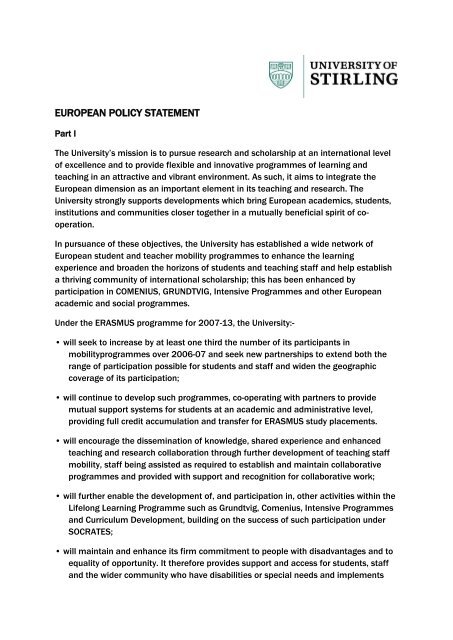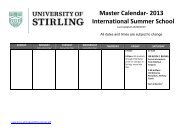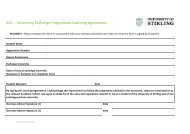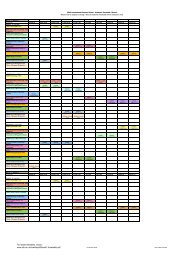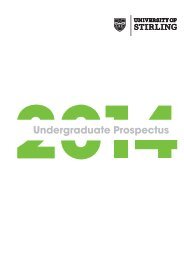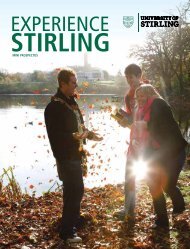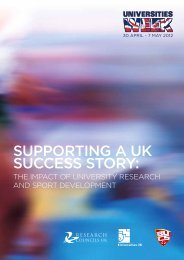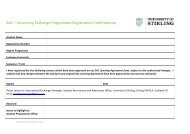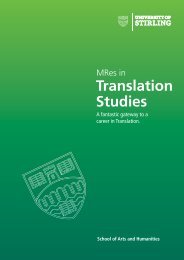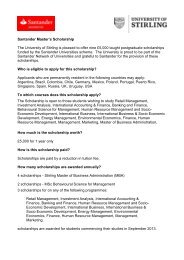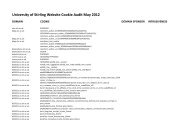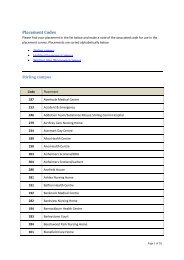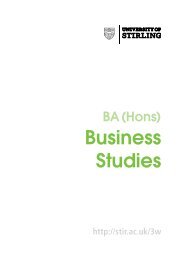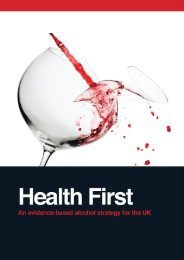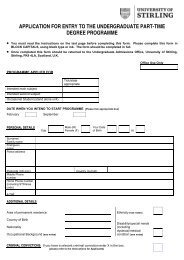European Policy Document - University of Stirling
European Policy Document - University of Stirling
European Policy Document - University of Stirling
Create successful ePaper yourself
Turn your PDF publications into a flip-book with our unique Google optimized e-Paper software.
EUROPEAN POLICY STATEMENT<br />
Part I<br />
The <strong>University</strong>’s mission is to pursue research and scholarship at an international level<br />
<strong>of</strong> excellence and to provide flexible and innovative programmes <strong>of</strong> learning and<br />
teaching in an attractive and vibrant environment. As such, it aims to integrate the<br />
<strong>European</strong> dimension as an important element in its teaching and research. The<br />
<strong>University</strong> strongly supports developments which bring <strong>European</strong> academics, students,<br />
institutions and communities closer together in a mutually beneficial spirit <strong>of</strong> cooperation.<br />
In pursuance <strong>of</strong> these objectives, the <strong>University</strong> has established a wide network <strong>of</strong><br />
<strong>European</strong> student and teacher mobility programmes to enhance the learning<br />
experience and broaden the horizons <strong>of</strong> students and teaching staff and help establish<br />
a thriving community <strong>of</strong> international scholarship; this has been enhanced by<br />
participation in COMENIUS, GRUNDTVIG, Intensive Programmes and other <strong>European</strong><br />
academic and social programmes.<br />
Under the ERASMUS programme for 2007-13, the <strong>University</strong>:-<br />
• will seek to increase by at least one third the number <strong>of</strong> its participants in<br />
mobilityprogrammes over 2006-07 and seek new partnerships to extend both the<br />
range <strong>of</strong> participation possible for students and staff and widen the geographic<br />
coverage <strong>of</strong> its participation;<br />
• will continue to develop such programmes, co-operating with partners to provide<br />
mutual support systems for students at an academic and administrative level,<br />
providing full credit accumulation and transfer for ERASMUS study placements.<br />
• will encourage the dissemination <strong>of</strong> knowledge, shared experience and enhanced<br />
teaching and research collaboration through further development <strong>of</strong> teaching staff<br />
mobility, staff being assisted as required to establish and maintain collaborative<br />
programmes and provided with support and recognition for collaborative work;<br />
• will further enable the development <strong>of</strong>, and participation in, other activities within the<br />
Lifelong Learning Programme such as Grundtvig, Comenius, Intensive Programmes<br />
and Curriculum Development, building on the success <strong>of</strong> such participation under<br />
SOCRATES;<br />
• will maintain and enhance its firm commitment to people with disadvantages and to<br />
equality <strong>of</strong> opportunity. It therefore provides support and access for students, staff<br />
and the wider community who have disabilities or special needs and implements
oth national and EU laws and guidelines fully within the ERASMUS programme.<br />
Additionally, the <strong>University</strong> operates on the basis <strong>of</strong> non-discrimination, whether <strong>of</strong><br />
gender, race or other factor, and has developed a range <strong>of</strong> internal, monitored,<br />
procedures to promote equality <strong>of</strong> opportunity and treatment which are applied fully<br />
in relation to ERASMUS as well as to general recruitment <strong>of</strong> staff and students and<br />
provision <strong>of</strong> opportunity within the institution;<br />
• will continue to promote widening access programmes, remote campuses,<br />
teleconferencing facilities and similar developments to maintain its leading position<br />
and close involvement in the move to opening access to education to all which<br />
remains an underlying goal <strong>of</strong> the institution in all its activities;<br />
• will encourage the spread <strong>of</strong> the benefits which flow from an outward-looking<br />
education to all its students and staff and to the wider community in furtherance <strong>of</strong><br />
its long-established commitment to life-long learning policies and activities;<br />
• will continue its goal to work with other educational institutions, governmental and<br />
non-governmental organisations and other bodies to return to the community the<br />
expertise developed by academic staff.<br />
The <strong>University</strong> has made this <strong>European</strong> <strong>Policy</strong> Statement available for students, staff<br />
and the community through its website (www.stir.ac.uk) and will publish its ERASMUS<br />
<strong>University</strong> Charter there and through internally-disseminated promotional<br />
documentation to ensure that all staff and students are aware <strong>of</strong> the collaborative<br />
opportunities available. These opportunities are also publicised in the main prospectus<br />
and in promotional materials sent to applicants.
Part II<br />
The <strong>University</strong> has a high rating for teaching and learning quality and implements UK<br />
quality study placement guidelines. Student mobility proposals requires a site visit to<br />
review the suitability <strong>of</strong> courses, support systems provision for housing and support for<br />
those with special needs. Departmental and central approval is required.<br />
Support and advice provision comes from an academic coordinator who organises<br />
promotion and selection, based on academic and equality criteria. Students have<br />
access to course listings and application procedures through the academic coordinator<br />
guiding the process and providing briefings.<br />
A learning agreement is approved showing the credit to be awarded for successful<br />
completion and is submitted to the host institution with its application form.<br />
Subsequently, students submit confirmation documentation concerning their<br />
registration and attendance and a transcript will be received.<br />
Students continue to have support from the academic and institutional coordinators to<br />
ensure they have advice and information, including details for their return when they<br />
progress to the next academic level, subject to meeting progress requirements. Credit is<br />
transferred using an agreed credit scheme and students will meet with academic<br />
coordinators to discuss their experience.<br />
Incoming students access module information, and application documentation via the<br />
website. Applicants’ programmes are checked by academic advisers, ensuring choices<br />
are appropriate. Students have access to academic advisory staff and to learning<br />
support. ERASMUS students are fully integrated into the <strong>University</strong> community with<br />
guaranteed housing and access to all the teaching, social and sporting activities. No<br />
tuition fee is charged. Students with special needs have access to specialist support on<br />
an individual basis. Transcripts are provided to facilitate credit transfer.<br />
Application, admission and monitoring processes are organised in accordance with the<br />
<strong>University</strong> policies on equality and non-discrimination.<br />
For teacher mobility, programmes have departmental sanction and the teaching<br />
experience is recognised, the potential being to develop student mobility or other<br />
academic collaboration. Both incoming and outgoing staff have the administrative<br />
support system <strong>of</strong> the academic department in relation to the organisation <strong>of</strong> their<br />
programmes. Support for incoming staff may include finding housing and access to<br />
departmental and <strong>University</strong> resources and facilities. Outgoing staff have a central<br />
administrative contact to assist with contractual and financial aspects. Staff<br />
participants in teacher mobility are expected to submit a report <strong>of</strong> their mobility both to<br />
their department and to the central coordinator.
Application for Extended <strong>European</strong> <strong>Policy</strong> Statement<br />
1.a) Please describe clearly your institution's strategy, objectives and priorities for its<br />
Erasmus activities (mobility, multilateral projects and networks, etc.) and any other<br />
actions in the context <strong>of</strong> the Lifelong Learning Programme.<br />
The information under this section should cover the following points:<br />
- What is the institution's previous experience in international exchange and<br />
cooperation programmes?<br />
- How does the participation in the Erasmus programme relate to the overall<br />
international strategy <strong>of</strong> the institution?<br />
- What are the institution's priorities/objectives to be reached by participating in the<br />
Erasmus programme?<br />
- What are the specific activities to be implemented in the framework <strong>of</strong> the Erasmus<br />
programme (e.g. exchange <strong>of</strong> students and staff, development <strong>of</strong> cooperation with<br />
higher education institutions or other types <strong>of</strong> institutions, participation in Erasmus<br />
multilateral projects/ networks)?<br />
The <strong>University</strong>’s Strategic Plan (2011-16) specifically refers to two strategic drivers that<br />
demonstrate its strategy, objectives and priorities for international activity and which<br />
encompass all Erasmus activity. The Plan states that we will strengthen our status as a<br />
globally connected institution, and provide a vibrant, multi-cultural, intellectually<br />
stimulating environment for our student community by increasing our international<br />
population and enriching the learning experience for all students.<br />
The <strong>University</strong> supports students on their learning journey and endeavours to ensure<br />
that our curriculum is relevant, distinctive, inclusive, and engaged with the world. It is<br />
our ambition to develop graduates who are active global and local citizens. In order to<br />
achieve this ambition, the <strong>University</strong> is in the process <strong>of</strong> establishing a new, dedicated<br />
Graduate School to provide a supportive environment for our graduate student<br />
population. It is also committed to maximising employment experiences, encouraging<br />
work placements and international study to augment the traditional student learning<br />
experience. It recognises that such opportunities are valuable for employability and<br />
considered desirable graduate attributes.<br />
The <strong>University</strong> has a long history <strong>of</strong> exchanging students both within Europe dating back<br />
to the Socrates programme since 1988 and beyond Europe, especially in North America<br />
where it has held continuous exchange agreements that were established soon after its<br />
founding in the late 1960s. Recently the <strong>University</strong> has attempted to develop new<br />
international study and placement opportunities, in line with its internationalisation<br />
strategy, for students studying and seeking out placements in subjects that have been<br />
traditionally underrepresented, such as nursing and law.<br />
It is expected that successful application for the Extended Erasmus <strong>University</strong> Charter<br />
and the resulting ability to arrange placement opportunities for its students will enable
the <strong>University</strong> to realise an intended outcome associated with its Strategic Plan, to<br />
establish multi-strand (research and education) partnerships with a range <strong>of</strong> academic<br />
institutions and businesses.<br />
We are currently active in numerous Erasmus strands including Erasmus Student<br />
Mobility – Study (SMS) and Erasmus Staff Mobility – Teaching (STA), sending and<br />
receiving students in near equal numbers and having increased the number <strong>of</strong> staff<br />
taking part in STA from two in 2009/10 to 14 in 2011/12. Often SMS and STA mobility<br />
is interconnected and the two strands are mutually reinforcing. In addition the<br />
<strong>University</strong> is contributing to a number <strong>of</strong> Erasmus Academic Networks including ‘Aquanet’.<br />
It is hoped that addition <strong>of</strong> the Erasmus Student Mobility – Placement (SMP)<br />
strand will enable the <strong>University</strong> to broaden the variety <strong>of</strong> opportunities open to<br />
students to spend a portion <strong>of</strong> their studies outside <strong>of</strong> Scotland and make it an even<br />
more attractive destination for students seeking an international education.<br />
What specific actions are planned to give visibility to Erasmus activities and what type<br />
<strong>of</strong> publicity will be given to the Erasmus <strong>University</strong> Charter and the EPS?<br />
Student exchange opportunities are promoted through many <strong>of</strong> the same channels as<br />
other exchange programmes, mainly in the form <strong>of</strong> fairs, information events, email<br />
blasts, www.stir.ac.uk/erasmus, and local promotion through our Schools.<br />
Opportunities for participation in staff exchanges are publicised through the senior staff<br />
from each School and via School websites. The Erasmus <strong>University</strong> Charter is posted<br />
visibly in the International Office and the EPS is published on www.stir.ac.uk/erasmus.<br />
What kind <strong>of</strong> arrangements, if any, does the institution ensure to comply with nondiscrimination<br />
objectives (e.g. actions related to gender equality, integation <strong>of</strong> disabled<br />
students and staff, enhancement <strong>of</strong> social and economic cohesion and combating <strong>of</strong><br />
xenophobia and racism)?<br />
The <strong>University</strong>’s Single Equality Scheme sets out how we will tackle discrimination and<br />
harassment and promote equality for staff, students and service users. This and related<br />
resources, including policies and support available through HR, Student Development<br />
and Support (incorporating the Disability Service), can be found at<br />
www.diversityandequality.stir.ac.uk. International students benefit from a full-time<br />
International Student Advisor and services provided by the Student Union.<br />
What kind <strong>of</strong> specific measures are implemented to ensure high quality in student<br />
placement? Give details on how the work-programme and the placement agreement<br />
are prepared and implemented. Please describe the practical arrangements agreed<br />
between the parties. Please specify also the monitoring and evaluation <strong>of</strong> the<br />
placement period as well as its recognition in the curriculum.<br />
The <strong>University</strong> <strong>of</strong> <strong>Stirling</strong> ensures that student placements meet the principles <strong>of</strong> the UK<br />
Quality Assurance Agency’s Code <strong>of</strong> Practice on Placement Learning. Placement<br />
mobility under the charter will be embedded within the student’s programme <strong>of</strong> study
and will as such be governed by the <strong>University</strong> academic framework and all relevant<br />
pr<strong>of</strong>essional requirements.<br />
The placement organiser in each School will determine whether a placement is an<br />
appropriate learning environment that ensures students develop key skills and obtain<br />
relevant practice and experience. In advance <strong>of</strong> any placement being arranged practice<br />
and academic learning outcomes will be clearly defined and communicated to the<br />
student and the host placement institution.<br />
In some pr<strong>of</strong>essional subject areas, placements will be formally organised for students<br />
while in other areas students will generate the placement themselves and request the<br />
School to contact the placement provider on their behalf.<br />
Approval <strong>of</strong> the placement will only be secured if a common understanding <strong>of</strong> host<br />
institution and visiting student responsibilities is agreed. Once approval has been given,<br />
students will be informed that they are subject to the same conditions that would apply<br />
to all employees in the placement area.<br />
Students will develop a learning plan for their placement visit. During the placement all<br />
involved parties will maintain regular contact in order to monitor and evaluate the<br />
progress <strong>of</strong> the placement and attainment <strong>of</strong> the agreed learning outcomes. Students<br />
must submit a report on on return to the <strong>University</strong> and share their experiences.<br />
Each year an annual report will be prepared for placement activity, containing evidence<br />
from the participant students, the school placement organiser and the host institutions<br />
placement contact about the nature, conduct and learning environment <strong>of</strong> the<br />
placement. Credit for placement learning experienced will be determined in the School<br />
examination board in line with normal practice.<br />
Last updated April 2012


